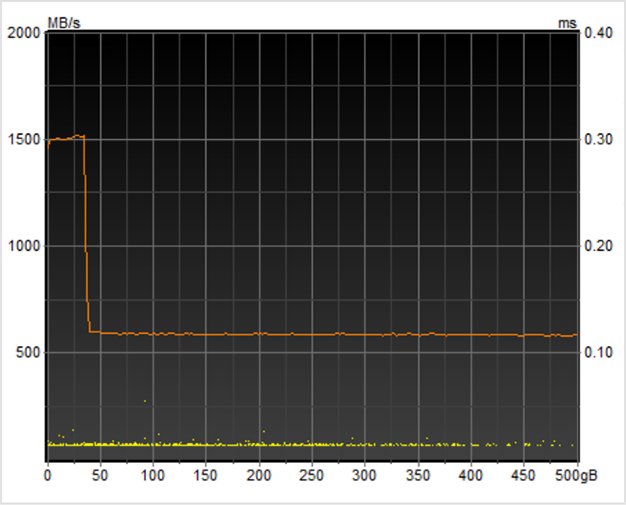Samsung SSD 960 EVO NVMe M.2 Review: Ultra Fast, Affordable Storage
|
| Usage Application | Client PCs | |||
| Capacity | 250GB, 500GB, 1TB | |||
| Dimensions (LxWxH) | Max 80.15 x Max 22.15 x Max.2.38 (mm) | |||
| Interface | PCIe 3.0 x4 (up to 32Gb/s) NVMe 1.2 (Partial) | |||
| Form Factor | M.2(2280) | |||
| Controller | Samsung Polaris controller | |||
| NAND Flash Memory | Samsung V-NAND 3-Bit MLC | |||
| DRAM Cache Memory | 512MB or 1GB LPDDR3 (1GB on 1TB drive) | |||
| Performance* | 250GB, 500GB | 1TB | ||
| Sequential Read: | ~3,200 MB/s | ~3,200 MB/s | ||
| Sequential Write: | ~1,500 MB/s, 1.800MB/s | ~1,900 MB/s | ||
| 4KB Random Read (QD32): | ~330K IOPS | ~380K IOPS | ||
| 4KB Random Write(QD32): | ~300K, 330K IOPS | ~360K IOPS | ||
| 4KB Random Read (QD1): | ~14K IOPS | ~14K IOPS | ||
| 4KB Random Write(QD1): | ~50K IOPS | ~50K IOPS | ||
| Data Security | AES 256-bit for User Data Encryption, TCG Opal Family Spec | |||
| Weight | -10g | |||
| Reliability | MTBF : 1.5 million hours | |||
| Power Consumption** | Active average/maximum: 5.3W - 5.7W Idle APST On: 40mW DEVSLP(L1.2 mode): Typical .5mW |
|||
| Supporting features | TRIM (Required OS support), Garbage Collection, S.M.A.R.T | |||
| Temperature | Operating Temp : 0°C to 70°C (Measured by SMART Temperature. Proper airflow recommended) |
|||
| Humidity | 5% to 95%, non-condensing | |||
| Vibration | Non-Operating: | 20~2000Hz, 20G | ||
| Shock | Non-Operating: | 1500G , duration 0.5m sec, 3 axis | ||
| Warranty | 3 years limited | |||
| TBW | 250GB (100TBW), 500GB (200TBW), 1TB (400TBW) | |||
The Samsung SSD 960 EVO NVMe M.2 series drives will initially be offered in three capacities: 250GB, 500GB, and a 1TB. We’ve got a 500GB drive to show you here. All of the drives in the line-up have the same M.2 (2280) ‘gumstick’ form factor and offer peak read bandwidth of 3.2GB/s, with 1.5GB/s - 1.9GB/s writes, with various IOPS and endurance ratings.
The Samsung SSD 960 EVO family features 3rd Generation, 3-bit MLC V-NAND Flash memory (128Gb on the 250GB drive, and 256Gb on the 500GB and 1TB drives) and a the same Polaris controller used on the 960 PRO, which has a native PCIe gen 3 interface and supports the NVMe 1.2 protocol. Arriving alongside the drive is a new revision of Samsung's NVMe driver (v2.0), which we used for all of our testing, though a version of Samsung's SSD Magician utility that supports the 960 EVO was as of yet unavailable. We're told it's coming though.
Depending on the capacity, the drives also feature 512MB or 1GB of LPDDR3 DRAM cache, and the cache actually resides on the same package as the controller (to save space on the PCB). Other than its interface, details are scarce on the Samsung Polaris controller. However, in concert with the drive's firmware, it performs all of the functions you’d expect a modern SSD to do, like TRIM, garbage collection, S.M.A.R.T., etc., and it supports various encryption technologies too. Internally, the Polaris controller is packing 5 processor cores (versus 3 on the UBX controller from the 950 Pro series), with one of these cores dedicated to optimizing communications between the host CPU and SSD controller.
Like previous generation EVO-series drives, the Samsung SSD 960 EVO supports Samsung's TurboWrite technology, though it has gotten more intelligent. TurboWrite essentially uses a small portion of the NAND as an SLC write buffer, which translates into improved write performance, as long as the buffer isn’t exhausted.

The TurboWrite buffer size now dynamically adjusts based on the workload. Samsung is calling it Intelligent TurboWrite, and it works by identifying user workloads and tweaking the size of the SLC buffer accordingly. With the 500GB model, for example, if the user's dataset is under 4GB, intelligent TurboWrites uses the pre-allocated (default) TurboWrite region. If it is more than 4GB, however, the 960 EVO can use an additional 18GB dynamic SLC buffer for a total of 22GB SLC buffer on the 500GB drive. The default and dynamic sizes of the buffer are defined in the chart above.

TurboWrite should allow the SSD 960 EVO series to perform very well in the vast majority of consumer-class workloads. As you can see in the screen-capture above (taken from HD Tune using a 500GB drive), writes are much faster when the TurboWrite buffer is being utilized, but once that 22GB mark is hit, writes taper off.
Samsung warranties the SSD 960 EVO drives for 3 years and they have relatively high endurance ratings as well, considering the cost of the drives (up to 400TBW). Endurance specifications are significantly reduced in comparison to the 960 PRO, however. The drives also have built-in thermal protection, which is to say they’ll throttle to protect the NAND and controller if temperatures get too high, but this too has been improved over the previous generation. The Samsung SSD 960 EVO features a new heat-spreader design(in the label) that can dissipate heat more efficiently during heavy workloads. According to Samsung, the thermal trigger point is delayed by up to 16 seconds relative to the 950 PRO, which translates into roughly 60% more data that can be transferred before throttling.







